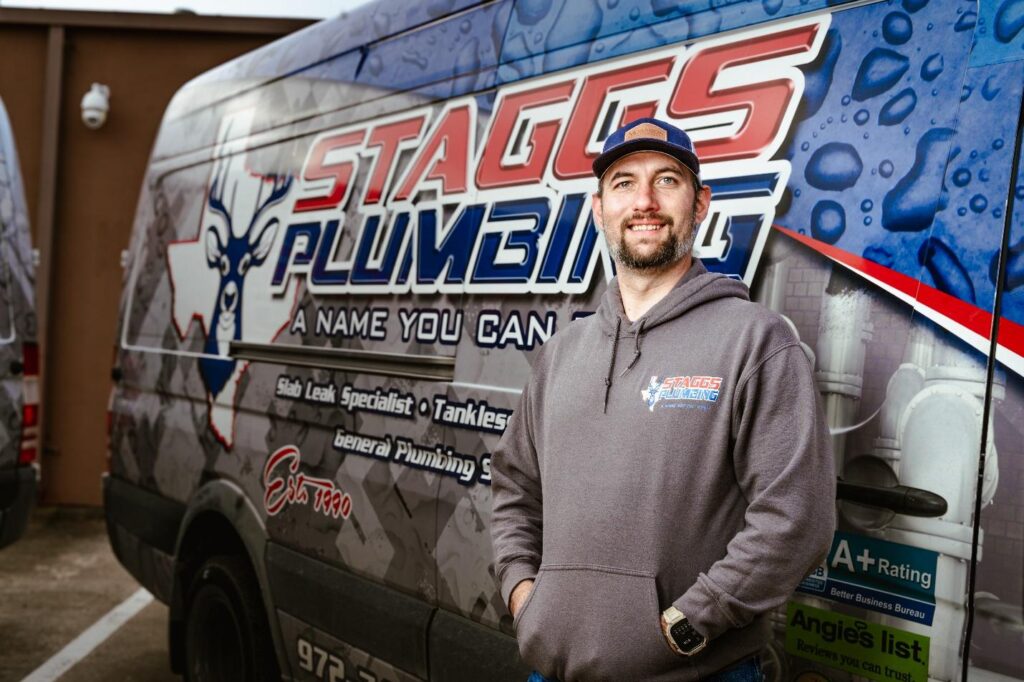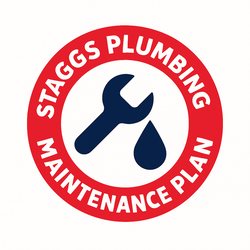Gas Tankless Water Heater Services in Plano, Rockwall, TX and Dallas–Fort Worth Metroplex
Never Run Out of Hot Water With a Gas-Powered Tankless Water Heater
If you are thinking about replacing or installing a water heater in your home, many modern options are available. Conventional hot water tanks range in capacity from 30 to 80 gallons. On the other hand, tankless systems provide continuous, on-demand hot water. Tankless water heaters can be powered by natural gas, electricity, or propane and produce around 2 gallons per minute up to almost 10 gallons per minute.

1st Time Customers
Expires July 19, 2025

Tankless Water Heater Installation
Expires July 19, 2025
Running hot water may have been seen as a luxury item 100 years ago, but now it is an essential part of everyday life. It needs to be:
- Reliable
- Tailored to your needs
- Efficient
Tankless water heater technology has advanced significantly in the past decade and offers many advantages over the conventional storage tank counterparts. If you want to replace your water heater with an energy-efficient tankless water heater, call the professionals at Staggs Plumbing! Staggs Plumbing has been serving the North Texas area for over 30 years, and we pride ourselves on providing quality work and expert advice. That’s why we have become known by your neighbors as the trusted plumber.

Is Making the Switch to a Tankless System a Worthwhile Investment?
When it comes to choosing the type of water heating system for your needs, it is such an important decision to make. We recommend that you research the pros and cons or call one of our plumbing experts to determine what hot water solution is right for you. Staggs Plumbing has been installing, repairing, or replacing water heaters for over 30 years in the North Texas area.
This reference article is designed to help you understand the various aspects of the different types of water heating systems so that you can make an informed decision.

Tankless Vs. Storage Tank System
This is the biggest choice you will have to make. There are several aspects of a water heating system that you need to consider. Please refer to the table below to help in your research when buying a new water heater.
| Tankless | Conventional Storage Tanks |
| Hot water on demand – normally won’t run out | Preheats and stores hot water in the tank – has a limited amount of hot water |
| Economical once installed – only heats the water you need | Heats the entire tank of water, regardless of if it’s needed or not |
| Environmentally friendly – only heating what is required | Not an intelligent or adaptive system, therefore not as environmentally friendly |
| Longer life span of 15 to 20 years | Shorter life span of seven to 13 years |
| Potential space-saving – no need for a storage tank | Can require a lot of space |
| Higher installation costs | Cheaper to install |
| Can only cope with so many appliances running at once – washing machine, dishwasher, shower | Larger tank unlikely to run out of hot water if used sensibly |
Call our expert plumbers at 972-833-8660 once you understand the different options and want to get a second opinion. This is a significant investment, and we pride ourselves on giving the most useful advice to our customers. Our local knowledge of the water conditions and the price of gas or electricity, for example, may also have a bearing on your final decision.
Here are a few little things to bear in mind:
- Your location determines your water type. North Texas cities have hard water, which means mineral buildup over time that can lead to more frequent maintenance.
- How long do you plan on staying in your home? Tankless systems powered by natural gas may save you money in the long run, but it might take a few years to recover your initial investment.
- A tankless system cannot leak gallons of water into your home.
- Tankless heaters make your home more efficient, potentially adding value to your home for prospective buyers.
- If you have natural gas already running to your home, it’s quite likely that we can hook up a tankless unit in other areas of your home besides the current storage tank location. If you do not have natural gas available in your home, you may want to consider liquid propane or an electric-powered unit.
What Should You Consider When Buying a Gas Tankless Hot Water System?
Heater Size
Water heating is responsible for approximately 20% of an average home’s energy bills. With the new tankless water systems, you need to consider the Gallons Per Minute (GPM) rating. This is basically how many gallons per minute you can get continuous hot water. It is also worth noting that physics does come into play here. Every time an additional faucet, dishwasher, or washing machine is being operated, this will have a detrimental effect on the water flow rate. If that scenario is a regular occurrence in your household, it may be worth considering two separate heaters. Before speaking with our plumbing experts, consider your personal household usage. To give you a reference point, here are some examples of hot water appliances and their average usage:
| Jacuzzi | 4.0-5.0 GPM |
| Bath | 2.5-4.0 GPM |
| Shower | 1.5-2.5 GPM |
| Washing machine | 2.0-2.5 GPM |
| Kitchen sink | 1.5-2.0 GPM |
Heater Location
Due to the lack of a tank, the options now available for placement of your heater have drastically increased. Think about empty cupboards or out-of-the-way places where your heater can be installed, freeing up more valuable real estate. Once you have worked out where the heater will go, this will help you choose the most appropriate model. Our trained plumbers can also complete a site visit before installation to confirm the optimum location for both convenience and regulations. Also, consider the removal of the old tank, a service that our experienced and professional team will be happy to provide.
Tankless Water Heater Warranty
A water heater is a significant financial investment, so it is worth checking the length of the warranty. It may well be a shrewd decision to purchase the water heater with the longest warranty. However, the initial expenditure may be greater, the long-term benefits and peace of mind will certainly compensate. In other words, aim to take the longest warranty you can afford.
Rheem, for example, offers a 12-year warranty.
If you were going out to purchase a car, most people would know about each manufacturer and its reputation. This can certainly influence your decision-making process. But general knowledge of gas tankless water heater manufacturers is probably a lot more limited. Below are five manufacturers with a good reputation for reliability and performance. We only select the best water heater brands, and we are fully qualified and licensed to install products from these manufacturers.
- Takagi water heaters
- Rheem water heaters
- Ecosmart water heaters
- Rinnai water heaters
- Eccotemp water heaters
The Cost of Gas Tankless Water Heaters
The initial cost of a gas tankless water heater can vary between $500 to $1,200, compared to $300 to $700 for the electric variant. Gas heaters are normally more expensive to install and are subject to significantly more regulations.
If you need to run natural gas lines to your home, that will be a high cost. At that point, you might want to consider an alternative energy source such as propane or electricity.
Whilst nobody can predict the future, there is a strong belief that the cost of natural gas will drastically increase over the next couple of decades, so this needs to be factored into the equation. According to the U.S. Energy Information Administration, consumer electricity prices rose 12.8% between 1994 and 2005, whereas natural gas prices rose 114.5% in the same time period. While historical data is no guarantee of future changes, it is still worthy of consideration.
Maintaining Gas Tankless Water Heaters
Because of the design of these units, due to the hard water that exists in North Texas, we recommend performing regular maintenance. More information can be found here. You can also contact us and ask what other plumbing services we recommend for your home.
Tankless Water Systems
Tankless gas water heaters are significantly more efficient than storage tanks. At the time of writing, natural gas is also significantly cheaper than electricity, and this is certainly a factor that should be taken into consideration.
Take your time when deciding, and factor everything into the equation. Feel free to call our office and speak with a certified plumber to discuss all of the issues and concerns that you may have. In the meantime, please read the rest of the information contained on this page to further assist you with your choice of a natural gas-powered tankless water heater system.
The modern way to heat your home is with a tankless water heater. In simple terms, this is a relatively new style of heating system, which heats the water on demand.
- Unlimited hot water – Never again be the last person into the bath to discover the hot water in the tank has all been used, and your hot bath is tepid at best.
- Environmentally friendly – You are only heating the water you use, compared with the old tank systems, which heated an entire tank unnecessarily.
- Economical – In much the same vein as above, you are not wasting valuable energy and money heating a tank of water when you only need a washbasin full.
- Less space required – Without the need for huge storage space, these systems are much better suited to modern living conditions.
How Does a Tankless Hot Water System Work?
A tankless water heater works by forcing cold water through a small pipe within the heater. As water passes through the pipe, it is rapidly heated by a natural gas-powered heater. This ensures a never-ending supply of hot water and is roughly 22% more efficient than the storage heater systems of old.
For this article, we will focus entirely on the natural gas-powered variety of tankless water heaters.
The Conventional Storage Tank System
When people think of a water heating system, this is the model most people think of. For many years, these were the systems of choice, and there are still situations in which they may be the best option.
They essentially consist of a storage tank, which varies in size and is insulated. The capacity ranges from 30 to 80 gallons. This system works by heating all of the water in the tank and then keeping it warm for use as and when required.
They are available in electric, liquid propane, and natural gas models. Electricity-powered heaters tend to be the least economical and most expensive to run when all other considerations, such as size, are factored in.
Sizing a Storage Hot Water Tank
When choosing a storage heater, you will normally choose based on the amount of water your prospective system will hold. This tends to be how they are classified.
| Family size | Electric | Natural or liquid propane gas |
| 5+ | 80 | 50 |
| 3-4 | 50 | 40 |
| 2-3 | 40 | 40 |
| 1-2 | 30 | 30 |
Water Heater Recovery Rate
When considering a traditional tank water heater system, make sure to ask about the recovery rate. This provides a standard measurement of how many gallons of water can be heated in an hour once the preheated water has been used. The bigger the water tank, the longer it takes to heat the water to the desired temperature.
This is one of the negatives of a storage tank system compared to a tankless system, which effectively provides hot water on demand.
Storage Tank Size
New water heater regulations have been introduced by the Department of Energy to increase maximum energy-efficiency standards. The NAECA (National Appliance Energy Conservation Act) guidelines came into force in 2015. Dimensions will generally increase by 2 inches wider in both width and depth compared to previous heaters. If the location of your tank is somewhere that has plenty of space, then this is unlikely to present any problems. But if your current heater system barely fits into its current location, then there are a couple of options available to you. Once you discuss your situation with our plumber, we can either:
- Install a lower-capacity storage tank system
- Upgrade you to a tankless system
- Try to find an alternative location for your new water




